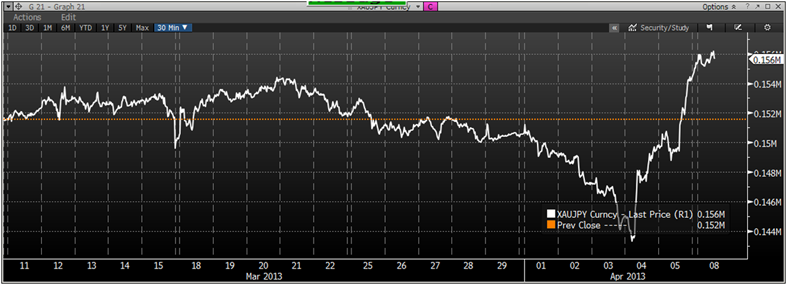Friday’s AM fix was USD 1,552.75, EUR 1,207.42 and GBP 1,019.60 per ounce.
Gold climbed $25.90 or 1.67% to $1,579.10/oz and silver rose 42 cents or 1.6% to $27.29/oz on the COMEX on Friday. Gold and silver were down 1.07% and 3.77% for the week.

Cross Currencies Table – Bloomberg
Gold futures in Tokyo jumped almost 5% to near all time nominal highs, marking their sharpest daily rise since September 2011, after the yen dropped to near four-year lows on reports that the Bank of Japan would begin buying longer-dated bonds immediately and due to concerns about a currency crisis in Japan after George Soros warned of a potential “avalanche” of yen selling.
That “avalanche” would appear to have begun with the yen having fallen by 8% against gold in 3 trading days since last Thursday.
Overnight in Tokyo, gold futures surged to 5,025 yen ($51.71) per gram, near the record high of 5,081 yen per gramme touched in February. The BOJ is set to buy 1.2 trillion yen ($12.35 billion) of government bonds with a maturity of over five years this week. The measures reek of desperation and will lead to a further devaluation in the at risk yen.
Yuichi Ikemizu, branch manager for Standard Bank in Tokyo told Reuters that "if the yen goes up to 100 (USD) then we have quite a good chance to try higher prices for TOCOM gold."
Last week, the BOJ promised to inject about $1.4 trillion into the economy in less than two years, a gamble that saw the yen tumble 8% against gold from 0.144 million yen per ounce last Thursday to over 0.156 million yen per ounce this morning.

Gold in JPY (2 Months) – Bloomberg
Soros has made headlines again this morning after an interview done in the South China Morning Post.
Excerpt of Soros Interview with South China Morning Post:
What is your view on gold?
A: That’s a complicated question. It has disappointed the public, because it is meant to be the ultimate safe haven. But when the euro was close to collapsing in the last year, actually gold went down, because if people needed to sell something, they could sell gold. Therefore they sold gold. So gold went down together with everything else.
Gold was destroyed as a safe haven, proved to be unsafe. Because of the disappointment, most people are reducing their holdings of gold. But the central banks will continue to buy them, so I don’t expect gold to go down. If you have the prospect of a crisis, you will have occasional flurries or jumps. So gold is very volatile on a day-to-day basis, no trend on a longer-term basis.
In the interview, Soros makes some somewhat contradictory comments about gold. Soros said regarding gold that he did “not expect gold to go down” due to central bank adding to their gold reserves.
Soros notes that “the public” has been selling gold because they are “disappointed” because gold is “meant to be the ultimate safe haven” and yet is has not acted that way despite the “euro being close to collapsing last year”.
In the aftermath of the euro nearly collapsing, Soros says that gold was “destroyed as a safe haven” and “proved to be unsafe”.
Soros may be suggesting that the public’s perception in recent months that gold is no longer a safe haven has led to the less informed public selling gold, unlike more prudent central banks.
Soros can speak cryptically at the best of times and his choice of words are very important. Soros spoke in the past tense, using the words "was" and "proved" in relation to gold not being a safe haven during the euro crisis of 2012.
It is worth noting that the public perception is inaccurate as gold rose in all fiat currencies in 2011 and again 2012.

Gold in JPY (3 Years) – Bloomberg
As one of the most erudite investors in the world, Soros knows that long term gold remains a safe haven as shown in academic research and history including recent history since the financial crisis began.
Soros understands gold’s value as a diversification and as a store of wealth unlike some of the more sensationalist elements of the online financial media who reported Soros’ comments with a very anti gold bias.
People from all over the world who had euro deposits in banks in Cyprus have realised gold’s importance as a diversification and a hedge against counter party and systemic risk.
Japanese people who own gold today are realising gold’s importance as a diversification and a hedge against currency devaluation.
Global diversification remains fundamentally important for savers and investors internationally and will protect from inflation, currency devaluation and confiscation in the coming years.
Zero Hedge
No comments:
Post a Comment